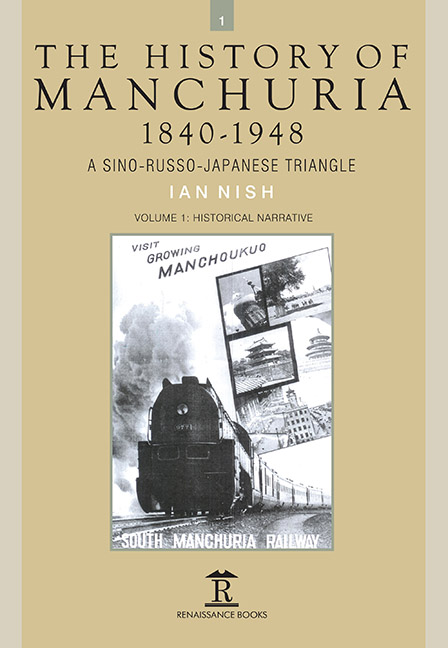Book contents
- Frontmatter
- Dedication
- Contents
- Preface
- Acknowledgements
- Name Conventions
- List of Abbreviations
- List of Maps
- Chapter One Manchuria and Russian Ambition, 1840s–1890s
- Chapter Two Sino-Japanese War and After, 1894–1900
- Chapter Three Prelude to the Russo-Japanese War, 1900–1905
- Chapter Four Railways, Reforms and Revolutions, 1906–1914
- Chapter Five Wartime Turmoil in Manchuria, 1915–1922
- Chapter Six Chang Tso-Lin’s Manchuria, 1922–28
- Chapter Seven Chinese Nationalism and Foreign Railways, 1929–1931
- Chapter Eight Lytton Commission in Manchuria, 1931–1932
- Chapter Nine Manchukuo: From Republic to Empire, 1933–1937
- Chapter Ten A Decade of Wars, 1938–1948
- Epilogue
- Map
- Select Bibliography
- Index
- Volume 2: Select Primary Sources
- Miscellaneous Frontmatter
- Dedication
- Miscellaneous Frontmatter
- Chapter 1 1840–1894
- Chapter 2 1895–1899
- Chapter 3 1900–1905
- Chapter 4 1905–1914
- Chapter 5 1915–1922
- Chapter 6 1922–1928
- Chapter 7 1929–1931
- Chapter 8 1931–1932
- Chapter 9 1933–1937
- Chapter 10 1938–1948
- Apendix Appeal by the Chinese Government
Preface
Published online by Cambridge University Press: 18 November 2023
- Frontmatter
- Dedication
- Contents
- Preface
- Acknowledgements
- Name Conventions
- List of Abbreviations
- List of Maps
- Chapter One Manchuria and Russian Ambition, 1840s–1890s
- Chapter Two Sino-Japanese War and After, 1894–1900
- Chapter Three Prelude to the Russo-Japanese War, 1900–1905
- Chapter Four Railways, Reforms and Revolutions, 1906–1914
- Chapter Five Wartime Turmoil in Manchuria, 1915–1922
- Chapter Six Chang Tso-Lin’s Manchuria, 1922–28
- Chapter Seven Chinese Nationalism and Foreign Railways, 1929–1931
- Chapter Eight Lytton Commission in Manchuria, 1931–1932
- Chapter Nine Manchukuo: From Republic to Empire, 1933–1937
- Chapter Ten A Decade of Wars, 1938–1948
- Epilogue
- Map
- Select Bibliography
- Index
- Volume 2: Select Primary Sources
- Miscellaneous Frontmatter
- Dedication
- Miscellaneous Frontmatter
- Chapter 1 1840–1894
- Chapter 2 1895–1899
- Chapter 3 1900–1905
- Chapter 4 1905–1914
- Chapter 5 1915–1922
- Chapter 6 1922–1928
- Chapter 7 1929–1931
- Chapter 8 1931–1932
- Chapter 9 1933–1937
- Chapter 10 1938–1948
- Apendix Appeal by the Chinese Government
Summary
MANCHURIA WAS PROMINENT on the international agenda from 1894 onwards. It acquired a distinct notoriety at the time of the Manchurian Incident of September 1931. It was then that the prominent scholar of the region, Owen Lattimore, published his book, Manchuria: Cradle of Conflict (Macmillan, 1932) arguing that there were so many rivalries inherent in the country that conflict was inevitable. This could either be between its mixed communities, the so-called five ethnicities of its population, or between China and outside parties in an age of expansion. It may be that the focus of world attention moved away from Manchuria to a preoccupation with European affairs for the rest of the thirties. But the Manchurian episode left its mark by revealing the inability of world statesmen to achieve a settlement for such complicated domestic problems and especially puncturing the prestige of the League of Nations as a mechanism for finding international solutions for regional disputes. To that extent it has a continuing relevance to our situation today.
Northeast and Central Asia have received special treatment in recent years. The History of Tibet in three volumes appeared in 2003 (Routledge) edited by Alex Mackay while The History of Mongolia in three volumes appeared in 2010 (Global Oriental) edited by David Sneath and Christopher Kaplonski. These were collections of specialized papers gathered usefully together with appropriate commentary. Thus, it now seems an opportune moment to highlight the place of Mongolia’s neighbour, Manchuria, in the history of Northeast Asia in the modern period. In doing so, I have tried to maintain a balance between the domestic features of the country and its place in international relations.
Like the countries in the other two series, Manchuria covers a vast under-populated territory and, because it became a subject of great international significance, it has attracted a vast literature. When I embarked on the research for this history, I thought it important to make use of documents which would reflect both the contemporary and later perceptions and feelings of China herself, which was very conscious of her status as the sovereign power, but also of the other countries which claimed to have ‘special interests’ in the territory, particularly Russia and Japan.
- Type
- Chapter
- Information
- The History of Manchuria, 1840-1948A Sino-Russo-Japanese Triangle, pp. xvii - xxPublisher: Amsterdam University PressPrint publication year: 2016

